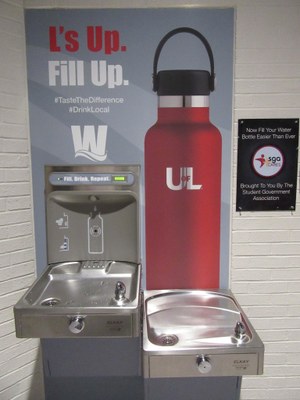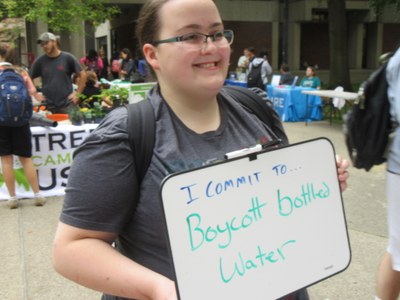UofL Sustainability Council proposes Bottled Water Phase Out Plan
Following a year of research and discernment, on December 14, 2024, the UofL Sustainability Council was proud to submit a proposed Bottled Water Phase Out Plan for the University of Louisville. This plan was requested by UofL President Kim Schatzel at a meeting held with the Council Chair and the Assistant to the Provost for Sustainability Initiatives on November 30, 2023. If approved for implementation, the Council stands ready to assist further.
In response to President Schatzel's request, the Sustainability Council assembled a diverse workgroup of students, faculty, and staff from across the university to meet regularly and discuss challenges, opportunities, and strategies with respect to the culture of bottled water usage across our campuses. Representatives from the Louisville Water Company and the Post-Landfill Action Network (PLAN) were brought in to consult on this work, examples from other schools were researched, and a university-wide audit of filling stations was conducted. The proposed plan is the result of that year-long collaborative process.
Our vision is to create a campus culture and environment where the default behavior is no longer consuming bottled water, but refilling containers with award-winning Louisville Tap. We seek a university where bottled water is no longer widely available, but instead everyone has easy access to local tap water.
This plan is designed to minimize the following negative environmental, social, and fiscal impacts of widespread bottled water usage: 1. Expense:
1. Expense:
- Recurring costs to the institution and to the individual associated with purchasing packaged water;
- Recurring costs to the institution of disposing of discarded single-use bottles.
2. Solid Waste:
- Burdens on the institution and the environment of having to properly manage and attempt to recycle high volumes of single-use disposable packaging.
3. Pollution:
- Carbon emissions associated with the extraction, bottling, and shipping of packaged water;
- Carbon emissions and other pollution associated with the extraction of raw materials for, and manufacture of, single-use disposable packaging;
- Carbon emissions and other pollution associated with the hauling, sorting, and recycling (or landfilling) of empty container waste;
- Litter and unintentional release of packaging wastes into the environment.
4. Health Risks:
- Bottled water quality is less regulated and tested than municipal tap water, which is held to a higher health standard;
- Microplastic concentrations are considerably higher in bottled water, and the potential risks to living organisms remain unknown. Bottled water contains harmful contaminants, experts warn.
 We recognize that full implementation of this plan will involve some up-front costs and may result in lost revenue from bottled water sales, but since most of the costs above are currently externalized, the overall social good and benefits to the university will be worth the investment.
We recognize that full implementation of this plan will involve some up-front costs and may result in lost revenue from bottled water sales, but since most of the costs above are currently externalized, the overall social good and benefits to the university will be worth the investment.
While this plan responds to widespread concerns about plastic pollution and its relatively low recyclability, the multiple goals outlined above would not be achieved simply by switching the material that single-use “packaged water” comes in, nor by switching the type of beverage consumed in single-use packaging.
What this plan seeks to do is to shift the default behavior (i.e. culture) on campus from consuming single-use disposable bottled water to consuming our local tap water. The campus community will be encouraged to drink Louisville Tap from fountains, filling stations, jugs, coolers, and pitchers, and to use refillable containers of all kinds (even if some of those containers may end up becoming single-use in certain settings – e.g. a paper cup used at an event).
The real problem this plan seeks to address is packaged water, not plastic bottles. We will use the term “bottled water” throughout this document to refer to any kind of packaged water in single-use disposable containers.
Read the full plan for phasing out bottled water at UofL here.



